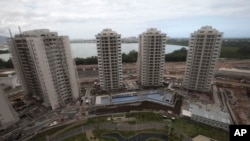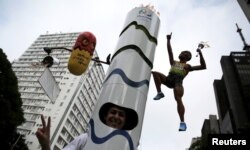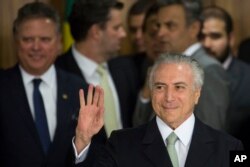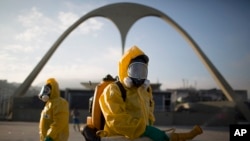As Olympics Near, Brazil’s President Faces Senate Trial – Voice of America (blog)
From VOA Learning English, this is In The News.
Brazil is preparing to host the Olympic Games in August, but the South American nation may not be celebrating.
Political problems and other issues have drawn attention away from the games in Rio de Janeiro and toward the country’s troubles.
This week, Brazil’s Senate voted to put President Dilma Rousseff on trial for manipulating the budget. She is suspended from office. Her replacement as acting president, Michel Temer, had to pay a fine for violating campaign finance laws.
Olympic impact

The 2016 Olympics Athletes’ Village is seen under construction in Rio de Janeiro, Brazil, July 23, 2015.
Brazil won the right to host the Olympic games in 2009 under then-president Luis Ignacio Lula da Silva. The country is estimated to have spent more than $13 billion preparing for the games and the 2014 World Cup Soccer competition.
Brazil’s Olympic bid was expected to show the country’s strength as a developing world leader. For some nations, hosting the games is considered a chance to show the world a nation’s arrival on the world stage. It also can showcase national unity.
Yet Brazil’s economy is in recession as oil and other commodity prices have dropped, hurting the nation’s exports. Many Brazilians blame Rousseff for the recession and for a corruption scandal at the state-owned Petrobras oil company.
BRICS have taken an economic hit
As South America’s biggest economy, Brazil is among the five BRICS nations. China, India, Russia and South Africa are the other members of the group. They account for 40 percent of the world’s population. They also combined to establish the New Development Bank in 2014 meant to fund infrastructure projects in the developing world.

A runner is dressed in a costume depicting the Rio 2016 Olympic torch, decorated with a figure of Jamaica’s Usain Bolt and a pill, before the annual “Sao Silvestre Run” (Saint Silvester Road Race), an international race through the streets of Sao Paulo, B
The BRICS economies, however, have seen reversals as oil and other commodity prices have dropped sharply in the last two years. Brazil’s economy shrank by nearly four percent last year.
Brazil is a major exporter of raw materials such as sugar, soybeans, coffee and iron ore. Falling commodity prices have hurt its foreign trade. Brazil’s imports from trade partners also have dropped.
Prices Brazilians pay for goods and services have been rising. Inflation is about ten percent. The political turmoil in the country has not helped the economy, which is not likely to restart growth this year. Economists say Brazil needs to put in place economic reforms aimed at improving the business climate and limiting public spending.
It remains unclear how the Olympics will affect the country’s struggling economy.
Many politicians touched by the Petrobras scandal
Brazil’s upper legislative body now must decide whether to remove Rousseff from office during this intense period for the nation.
Rousseff denies any wrongdoing. She called the charges against her “fraudulent,” and has called the impeachment process a “coup” against the country’s democracy.
Although Rousseff has been suspended from office for up to 180 days, other politicians face questions over their involvement in the Petrobras scandal.
Petrobras is Brazil’s huge state-owned oil company. Federal law enforcement officials are investigating payments made to politicians of the ruling Workers Party.

Brazil’s acting President Michel Temer arrives to speak, at Planalto presidential palace in Brasilia, Brazil, Thursday, May 12, 2016.
The man replacing Rousseff, Vice President Michel Temer, has been discussed in the Petrobras corruption investigation as well. He faces questions about his own conduct and is considered disloyal by Rousseff’s supporters.
Renan Calheiros, the leader of the Senate also has been named in the investigation as well. He is now second in the line of succession to the presidency according to AP news service.
Former House Speaker Eduardo Cunha had been a fierce critic of Rousseff. He had been second in line to the presidency, but he was suspended from office this month over charges of obstruction of justice and corruption.
Zika virus public health
As Brazil prepares for the huge sporting event, it faces not only the political storm in the capital, Brasilia. The nation has a public health crisis in the spread of the Zika virus.

FILE – a health workers stands in the Sambadrome spraying insecticide to combat the Aedes aegypti mosquito that transmits the Zika virus in Rio de Janeiro, Brazil.
Brazil reported its first case of Zika virus in May 2015. The World Health Organization (WHO) said the Zika virus could be linked to 4,000 suspected cases of microcephaly in Brazil. Microcephaly is when babies are born with extremely small heads. It causes severe brain damage. The virus is spread by mosquitoes and has caused infections in Brazil and many other countries in Latin America.
In February, the World Health Organization (WHO) declared the spread of Zika a global public health emergency. It warned pregnant women not to travel to places were the Zika virus is active, including Brazil.
After the outbreak, Brazilian officials sent 200,000 troops to homes to deliver information on how to get rid of mosquitos. In areas that will be used for this year’s Olympics, city workers sprayed chemicals to kill mosquitoes and their eggs.
An estimated 500,000 visitors are expected to come to Brazil for the Olympic Games. This has one public health official questioning in the Harvard Public Health Review whether the games should be moved or postponed.
And that’s In The News. I’m Mario Ritter.
Mario Ritter adapted this story from VOA reports and materials from Reuters, AP and additional sources. Hai Do was the editor.
_____________________________________________________________
Words in This Story
impeachment –n. to charge a public official with a crime committed in office
coup –n. an attempt by a small group to seize the government of a country
conduct –n. the way that something is managed or directed
obstruction –n. to place barriers in the way of getting something done
commodity –n. a good that is widely traded, usually on markets



